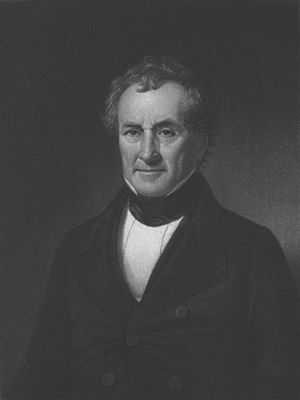Tallmadge Amendment facts for kids
The Tallmadge Amendment was an idea for a new rule about Missouri becoming a state in the United States. This rule, called an amendment, said that Missouri should join the U.S. as a state where slavery was not allowed. It also said that any children born to enslaved people in Missouri after it became a state would be free when they turned 25.
The idea was suggested in the U.S. House of Representatives on February 13, 1819. It was proposed by James Tallmadge Jr., a politician from New York.
The House of Representatives voted on the amendment, and it passed with 87 votes for it and 76 against. Most representatives from the northern states voted for it, while most from the southern states voted against it. However, when the amendment went to the Senate, it did not pass. All the senators from the southern states voted against it, and five senators from the northern states also joined them.
Because the Tallmadge Amendment failed, a different plan was made in 1820. This plan was called the Missouri Compromise. It tried to make both sides happy. Missouri was allowed to join the U.S. as a state where slavery was permitted. In return, Maine joined as a state where slavery was not allowed. Also, slavery was completely banned in the rest of the Louisiana Purchase territory north of a certain line (36˚30' parallel).
Why the Amendment Was Proposed
At the time, there was a big discussion in the U.S. Congress about whether Missouri should be a state and what that would mean for the balance between states that allowed slavery and states that did not. James Tallmadge was against slavery. He wanted to add rules to Missouri's statehood that would eventually end slavery there and free the people who were enslaved.
He proposed this rule:
And provided, that the further introduction of slavery or involuntary servitude be prohibited, except for the punishment of crimes, whereof the party shall have been fully convicted; and that all children born within the said State, after the admission thereof into the Union, shall be free at the age of twenty-five years.
This meant no new enslaved people could be brought into Missouri. Also, children born to enslaved parents in Missouri would become free at age 25.
In the U.S. government, each state has two senators, no matter how many people live there. But the number of representatives in the House depends on a state's population. To make things more complicated, states with slavery were allowed to count three-fifths of their enslaved population when figuring out their number of representatives.
The population in the North was growing faster than in the South. The South also had many enslaved people, which meant fewer people were counted as free citizens. So, the Tallmadge Amendment was seen as a way to reduce the power of the southern states in Congress.
Tallmadge gave a strong speech on February 16, 1819, supporting his amendment and the idea of ending slavery. The House of Representatives voted closely and approved the amendment that same day. But the Senate quickly rejected it. Congress then stopped its work on March 4, 1819, without deciding on Missouri's request to become a state. Discussions about the Tallmadge Amendment and Missouri's statehood continued for many months.
Arguments For and Against
People from the southern states in Congress said the Tallmadge Amendment was against the Constitution. They argued that Congress could not put conditions on states joining the Union. They believed it was up to the people of Missouri, not Congress, to decide if slavery would be allowed there.
Those who supported the Tallmadge Amendment argued that "slavery itself was a moral and political evil." They said it went against the spirit of the Declaration of Independence. They also argued that slavery was only allowed in the Constitution because it was necessary at the time, and now it should be limited.
The debate became very intense. People even talked about "disunion" (states leaving the U.S.) and "civil war." Thomas Jefferson, a former president, wrote that the sudden conflict woke him up like a "fire-bell in the night." Another politician, Thomas W. Cobb from Georgia, warned Tallmadge that he had started "a fire which only seas of blood could extinguish."
|
 | Calvin Brent |
 | Walter T. Bailey |
 | Martha Cassell Thompson |
 | Alberta Jeannette Cassell |



